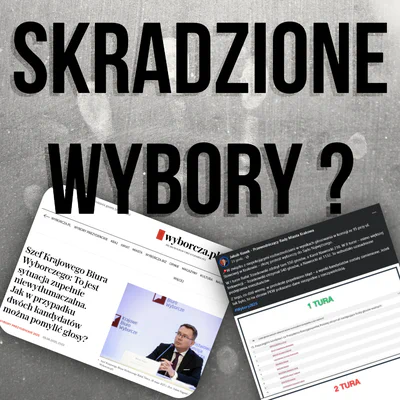I predicted Nawrocki's victory from the first round, and the snus incident only confirmed it. Dr Maria Libura on TOK FM independently reached the same conclusions about the viral potential of this gesture and Trzaskowski's strategic mistakes. Russians received a third gift after Zacharski and Smolensk - the conspiracy theory of stolen elections, which will give PiS a return to power.
A few days ago I wrote a comprehensive analysis about the conspiracy theory of stolen elections, which in my opinion will accelerate PiS’s return to power and weaken the remnants of progressive media’s reputation. Intellectuals and journalists don’t learn from mistakes and don’t draw conclusions from defeats, including those from across the ocean. Some of those following me on social media saw (fediverse) how a week before the end of the second round of the 2025 presidential elections I wrote that snus and Nawrocki’s stunt was a perfect PR move. Confirmation of this was found in Dr Maria Libura’s statement on TOK FM, who perfectly captured this context:
“After the famous snus incident, I thought that the elections were actually won, because the youth was drawn to the side of a specific candidate”
The “snus incident” refers to when Karol Nawrocki, during a televised debate, casually pulled out and used a nicotine pouch (snus) - a moment that went viral on social media and resonated strongly with young voters who consume such products and appreciate authentic, unscripted behavior.
Libura aptly noted that this gesture had enormous viral potential - young people consume content through YouTube and TikTok, not through television. Additionally, a self-made man like Nawrocki is more “digestible” than a representative of Warsaw elites.
Particularly valuable was Dr Libura’s attention to the untapped potential of the podcast format. Nawrocki excellently utilized the free form of expression in YouTube conversations, while Trzaskowski stuck to rigid, television formats. This is a serious strategic mistake in an era when podcasts are becoming the main communication channel with young voters.
However, it’s worth remembering what I wrote earlier on the blog about Joe Rogan’s podcasts and their potential for spreading disinformation and conspiracy theories. Let’s emphasize this: the same free form that makes podcasts so effective in persuasion is an ideal carrier for conspiracy theories and manipulation. This is a double-edged sword of contemporary political communication. Using only safe consumption channels targeting the already convinced produces the effects we’re seeing in the form of wishful thinking.
To tell the truth, from the results of the first round I wrote that Nawrocki would win. Snus only confirmed this, and burning through the negative narrative about “pimp and gangster” evidently didn’t appeal to voters. I’m pleased that my pre-election observations found confirmation in the expert’s analysis. Sometimes it’s good to be right, even if it means we live in a world where a nicotine pouch can determine the outcome of presidential elections. Although of course there were more causes like the potato sack or pimp.
Russians received three gifts polarizing Poles and destabilizing the state: the Zacharski and Olin affair (a Cold War-era spy scandal that continues to divide Polish society), the Smolensk catastrophe (the 2010 plane crash that killed President Lech Kaczyński and 95 others, which became a source of conspiracy theories claiming Russian assassination), and the current, pumped-up conspiracy theory of stolen elections. This last element, like Smolensk, gives PiS dominance in politics and a return… Stawiszyński, by conducting these two bold podcasts, has greatly risen in my esteem, because I value critical thinking as opposed to wishful thinking and stupidity.
Sources - recommended podcasts on the topic:
I recommend to all those who prophesy apocalypse, understanding that it’s not our fault that people go into politics who are so conceited that they lose elections and have nothing sensible to offer except settlements and hate campaigns. Besides, you also need to understand the “internets,” and the democratic opposition and KO apparently still haven’t learned this.
Prof. Jacek Hołówka on TOK FM - “Magnificent post-election achievement: sobering up”
Philosophical critique of the “political naivety” of elites who “religiously believed” in their victory. Hołówka describes how he “went to sleep convinced he knew what the election result was, and in the morning it turned out that those certain of victory were on the losing side.” He warns against “disruptions” with results and harshly evaluates the state of Polish political science - perfect complement to my analysis of wishful thinking mechanisms.
Stawiszyński Magazyn Filozofa “Wspaniałe osiągnięcie powyborcze: uprzytomnienie”
Dr Maria Libura on TOK FM - socio-economic analysis of elections
Sociological perspective on electorate flows and an interesting observation that “the most critical of the losing candidate’s campaign were liberal media.” Libura analyzes how progressive media suddenly “woke up” after defeat and began criticizing errors they had previously ignored. Plus the fascinating “snus theory” and analysis of the role of new media vs. traditional formats.
Presidential Election Series:
I also recommend my other articles on the 2025 presidential elections where I dealt with controversial topics:
MARGINALIA: The ‘Red Herring’ Technique: Brandolini’s Asymmetry as a Persuasive Tool
POSTS: Stolen Election Theory: Progressive Media Trapped by Confirmation Bias

